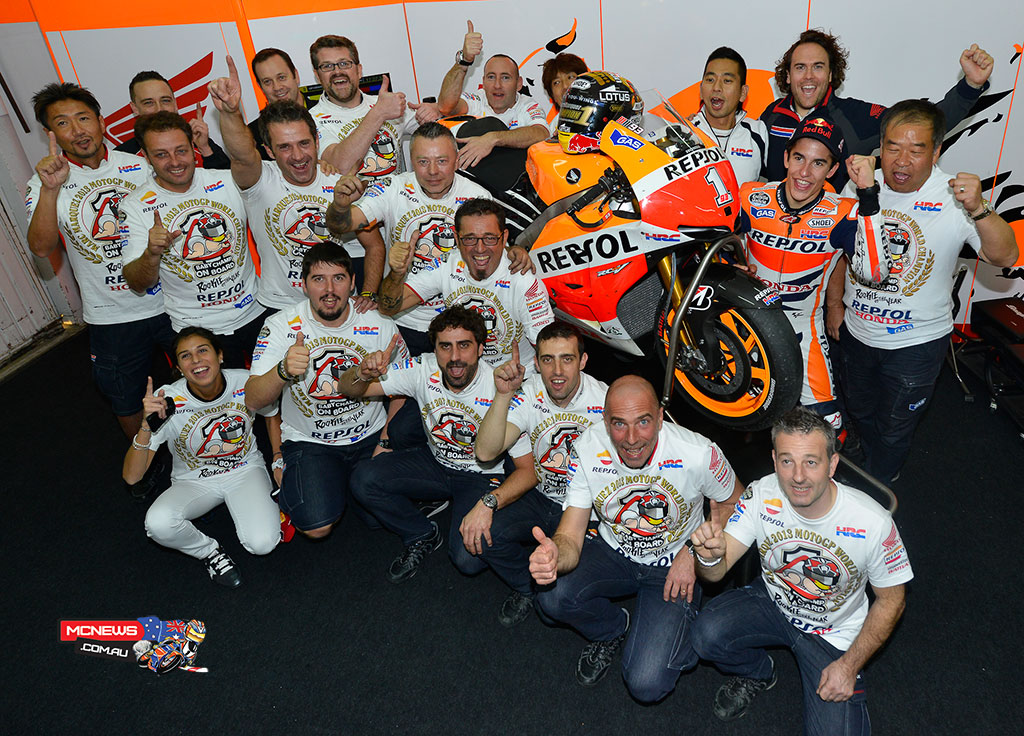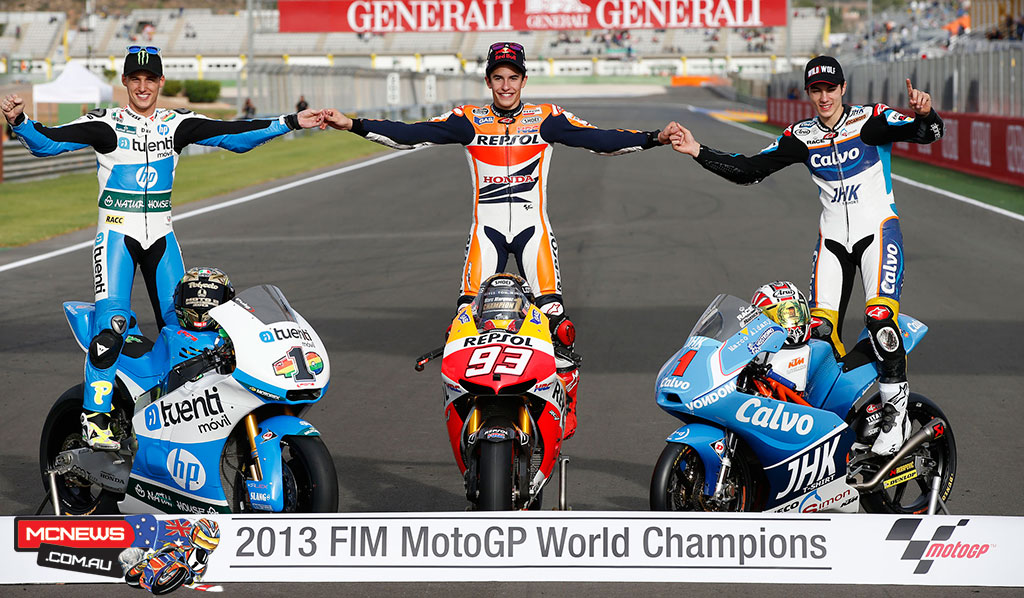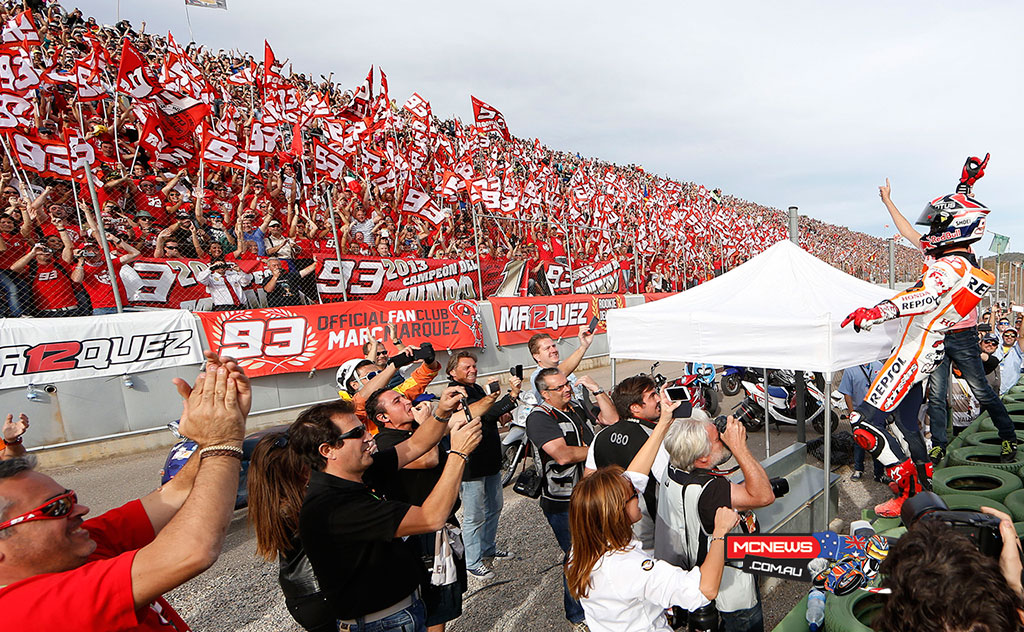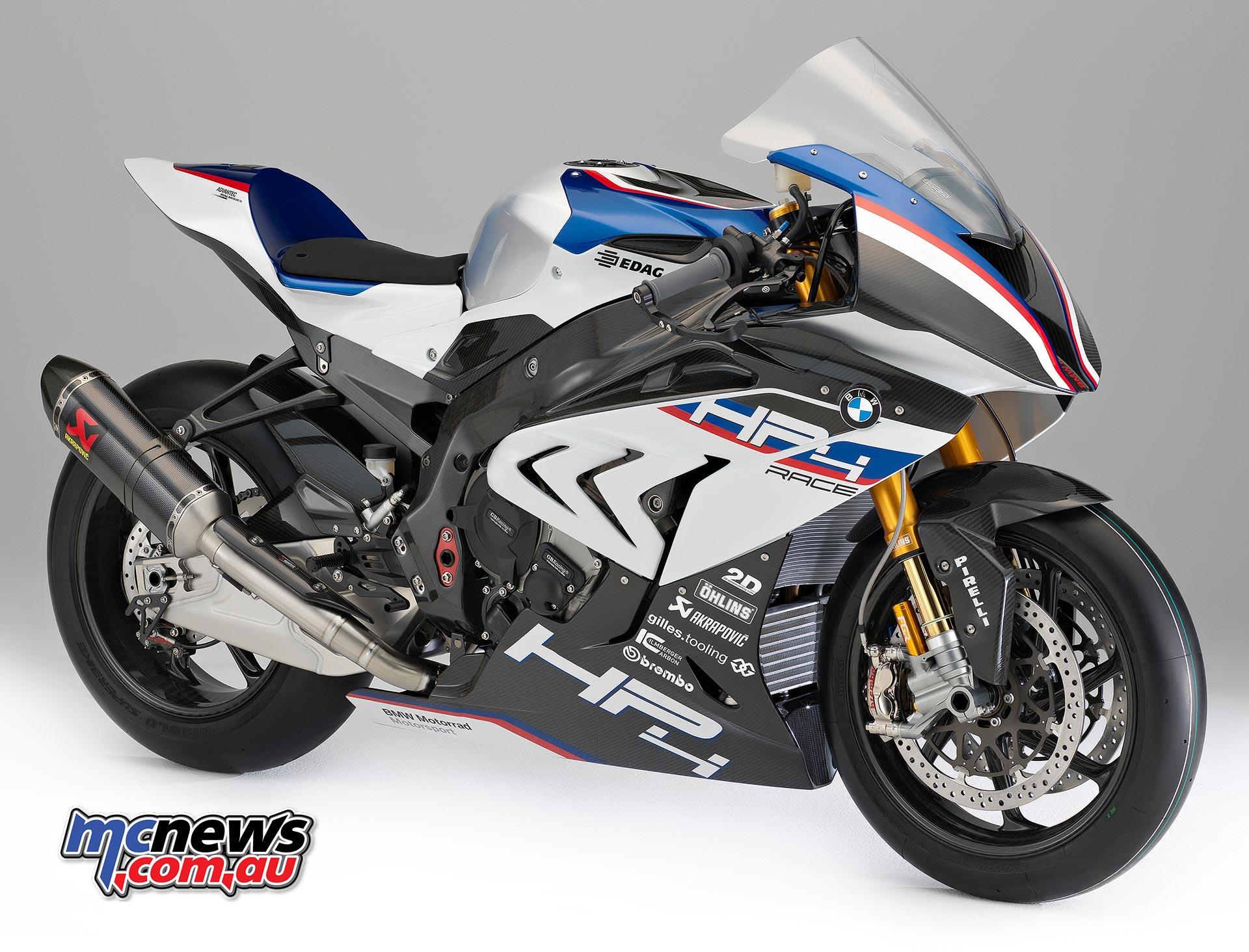— Marquez’s MotoGP Title
Marc Marquez is the youngest ever rider to clinch the premier class world title in MotoGP™. Thanks to a truly amazing debut season, the 20-year-old from Cervera, Spain also becomes the first rookie premier class World Champion for 35 years.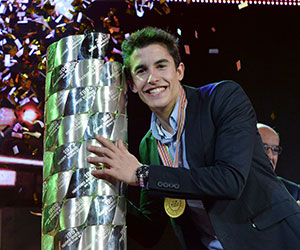
Márquez’s debut World Championship campaign in 2008 immediately served notice of his talent and he took a podium at Donington Park in his first season, despite a shortened campaign due to injury. In 2009 he scored a single podium on his way to eighth overall, before his full talent truly blossomed in 2010 as he scored an incredible ten victories from 12 pole position on his way to the 125 World Championship title. One of his most notable rides was his win from last on the grid in Estoril.
Stepping up to Moto2™ in 2011 the youngster got off to a rocky start, crashing out of the first two rounds. However, a first win in Round 4 at Le Mans laid the way for six more victories as he pushed Stefan Bradl closely for the title, until a crash in practice at Sepang ended Marquez’s season prematurely. Problems with his vision as a result of that crash cut short his 2012 pre-season, but he was well on the pace in the final test at Jerez and was therefore an instant favourite for the title.
Márquez did not disappoint in 2012, as he took victory in the first Moto2™ race of the season in Qatar and made his intentions clear with some tough and controversial overtakes in the race. A first DNF after a crash at a wet Le Mans gave his rivals hope, as compatriot Pol Espargaro mounted a strong challenge, yet after a coming together of the two at their respective home race in Catalunya – where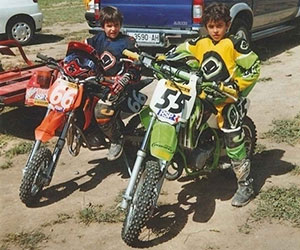 Espargaró crashed out and Marquez collected valuable points – the title race was strongly skewed in the eventual World Champion’s favour.
Espargaró crashed out and Marquez collected valuable points – the title race was strongly skewed in the eventual World Champion’s favour.
A total of nine wins – including two which saw him fight his way through the whole pack in Japan and Valencia – and 14 podiums ultimately saw the Spaniard take his maiden Moto2™ title before moving up to the Repsol Honda Team in the MotoGP™ premier class for 2013.
Moving into 2013, Marquez joined the previous season’s runner-up Dani Pedrosa. A remarkable start to the campaign saw him go head-to-head in Qatar with multiple World Champion Valentino Rossi, eventually losing out to the Italian. Despite that, Marquez’s rostrum at Losail would remarkably prove to be his first of 16 across the 18-round season, with the only two blots on his copybook being a crash while running second in the closing stages at Mugello and a disqualification for failing to make a mandatory bike change in time at Phillip Island.
At the inaugural Grand Prix of the Americas in Austin, Texas, he phlegmatically achieved his maiden premier class victory from pole position at only the second event of the campaign, in the process taking records away from Freddie Spencer as the youngest ever pole-sitter and race winner in MotoGP™. In Jerez, Marquez made headlines as he collided with reigning World Champion Jorge Lorenzo to grab second place at the final corner, then pulled a memorable pass on Rossi around the outline of Laguna Seca’s world-famous Corkscrew. At Silverstone, he lost out to Lorenzo in a last-lap battle that will go down in MotoGP™ folklore as the pair crossed the finish line just 81 thousandths of a second apart. They would trade paint again at Sepang, as Marquez came out on top for second position to further increase a championship lead he had retaken at July’s German GP following heavy crashes for both Lorenzo and Pedrosa. At both the Sachsenring and Indianapolis, the 20-year-old enjoyed perfect scores of pole position, fastest lap and race victory.
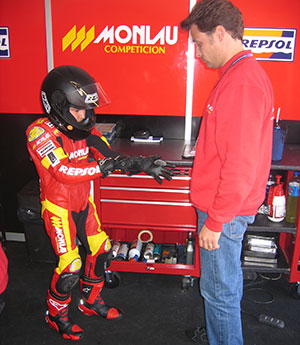 He clinched the title in Valencia on 10th November, replacing Spencer as the youngest ever premier class title winner by finishing in third place behind Lorenzo and Pedrosa following a thrilling early-race battle as the outgoing Champion attempted to slow the pace. Marquez therefore becomes the first debutant to clinch the premier class title since Kenny Roberts won in his first season of 1978. In doing so, he also becomes the 26th premier class World Champion in the series, which dates back to 1949. He is the third Spaniard to claim the ultimate honour, after Alex Criville (1999) and Jorge Lorenzo (2010, 2012), and has won the titles of all three classes across just four years.
He clinched the title in Valencia on 10th November, replacing Spencer as the youngest ever premier class title winner by finishing in third place behind Lorenzo and Pedrosa following a thrilling early-race battle as the outgoing Champion attempted to slow the pace. Marquez therefore becomes the first debutant to clinch the premier class title since Kenny Roberts won in his first season of 1978. In doing so, he also becomes the 26th premier class World Champion in the series, which dates back to 1949. He is the third Spaniard to claim the ultimate honour, after Alex Criville (1999) and Jorge Lorenzo (2010, 2012), and has won the titles of all three classes across just four years.
— Marc Marquez – MotoGP World Champion 2013
— Records relating to world title:
• Marquez is the first Rookie to win the premier-class world title since Kenny Roberts became 500cc world champion in 1978.
• At the age of 20 years 266 days Marquez is the youngest rider to win the premier-class world title, taking the record from Freddie Spencer who was 21 years 258 days old when he won the 500cc title in 1983 riding a Honda.
• Marquez is just the fourth rider in the 65 years history of grand prix racing to win world titles in three different categories, along with: Mike Hailwood, Phil Read and Valentino Rossi.
— Records set in 2013 on way to winning world title:
• At the opening race of the year in Qatar he became the fourth youngest rider of all-time to finish on the podium in the premier-class of Grand Prix racing after Randy Mamola, Eduardo Salatino and Norick Abe.
• At the first race of the year, Marquez set a new record for youngest rider ever to take the fastest lap of the race in the premier-class at the age of 20 years 49 days. The previous record holder was Freddie Spencer who was 20 years 161 days old when he had his first race fastest lap in the 500cc class at Misano in 1982.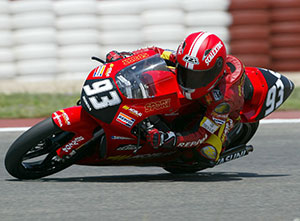
• His win at the Grand Prix of Americas at the age of just 20 years 63 days, made him the youngest ever rider to win a premier-class grand prix, taking the record from Freddie Spencer who was 20 years 196 days when he won the Belgium 500cc GP at Spa-Francorchamps in 1982.
• Qualifying on pole position in Austin at the age of 20 years and 62 days made Marquez the youngest ever rider to qualify on pole in the premier-class, taking the record from Freddie Spencer who was 20 years and 153 days when he qualified on pole for the first time in the 500cc class at Jarama in 1982.
• The victory in Austin also made Marquez the youngest ever rider in the 65 year history of World Championship Grand Prix racing to have won in three different classes, taking the record from his team-mate Dani Pedrosa who achieved this at the age of 20 years 227 days when he won in China in 2006.
• Marquez is the first rider to have won in either their first or second start in the premier-class for 15 years, since Max Biaggi won on his 500cc debut at Suzuka in 1998.
• He is the first rider since Jorge Lorenzo in 2008 to finish on the podium in his first two races in the premier-class.
• After podium finishes at the first two races, Marquez had joint leadership of the championship classification with Jorge Lorenzo and is the youngest rider ever to lead the premier-c lass championship, taking the record from Jorge Lorenzo who headed the championship standings after winning at Estoril in 2008 at the age of 20 years 345 days.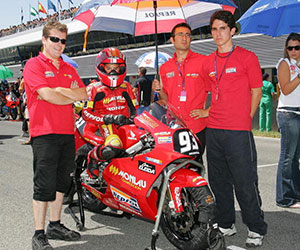
• The win in Austin also gave Marquez the record of being the youngest ever rider to take back-to-back podium finishes in the premier-class, taking the record from Randy Mamola who finished on the podium in Spain and then France in 1980 at the age of 20 years 197 days.
• At the Spanish Grand Prix, Marc Marquez became at the age of 20 years 77 days, the youngest rider to finish on the podium at three successive premier-class GP races, taking the record from Jorge Lorenzo who was 20 years 345 days old when he has his third successive podium in 2008.
• At the French Grand Prix he became only the second rider to finish on the podium in his first four races in the premier-class; the other rider to have achieved this is Max Biaggi in 1998.
• The victories by Marc Marquez at the Sachsenring and Laguna Seca give him the record of the youngest rider of all-time to win back-to-back races in the premier-class of grand prix racing at the age of 20 years 154 days, taking the record from Freddie Spencer who was 21 years 104 days old when he won in South Africa and France in 1983 riding a Honda.
• His wins at the Sachsenring and Laguna Seca also made Marquez the first rookie in the premier-class to win back-to-back races since Kenny Roberts in Austria and France in 1978.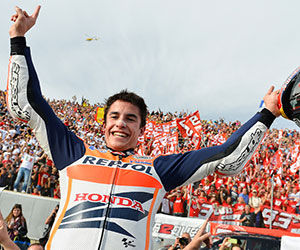
• His win at Indianapolis made Marquez only the second Rookie ever in the premier-class to win three successive GP races; the other is Kenny Roberts who won in Austria, France and Italy in 1978.
• The victories by Marquez at the Sachsenring, Laguna Seca and Indianapolis give him the record of the youngest rider of all-time to win three successive races in the premier-class of grand prix racing at the age of 20 years 182 days, taking the record from Freddie Spencer who was 21 years 125 days old when he won in South Africa, France and Italy in 1983.
• His win at the Czech GP gave Marquez the record of being the first Rookie ever in the premier-class to win four successive GP races.
• His win at Brno was the fifth win of the year – the greatest number of wins ever in the premier-class by a Rookie.
• The victories by Marc Marquez at the Sachsenring, Laguna Seca, Indianapolis and Brno give him the record of the youngest rider of all-time to win four successive races in the premier-class of grand prix racing at the age of 20 years 189 days, a record previously held since 1962 by Mike Hailwood at the age of 22 years 139 days.
• Marquez has finished in the top three sixteen times in 2013 – the greatest number of podium finishes ever by a Rookie in the premier-class.
• He has qualified on pole nine times in 2013 – the greatest number of pole positions ever by a Rookie in the premier-class.
• His points’ total of 334 is the greatest number of points ever achieved in a Rookie season in the premier-class.
— First steps (1993-2000)
On the 17th February 1993, a future champion was born in Lleida. Marc has always lived in Cervera, a small town near the capital of the province where he lives with his parents and his brother Alex. Year after year, his father used to drive with thousands of other fans by bike to Jerez, so it can come as no huge surprise that Marc would chose this path.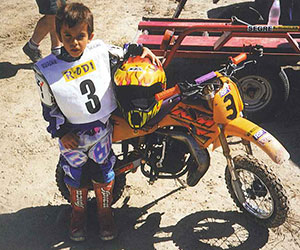
At the age of four, Marc asked for a motorbike for Christmas and, with two training wheels, he had his first experience. He would go with his father to an esplanade near their house, to an industrial area or even a friend’s field to practice before taking part in his first races. When he was five, he participated in “Enduro for kids” in the initiation category. He would have preferred to practice motocross, which was more fun and where all the riders started at the same time. Marc was able to test himself against other kids, without having to look at the times when the race is over. However, there wasn’t a class for his age at that time in motocross.
In 1999, his father bought him a second-hand 50cc off-road pocket bike, on which he continued to enjoy enduro and also to begin in motocross. In 2000, although he continued competing in enduro, he was also runner up in the Motocross Catalan Championship and, a year later, he took another step forward and won the Catalan Championship of the initiation category. He kept practising enduro, a discipline in which he finished fourth that year.
— From dirt to tarmac (2000-2007)
Later that year, The Catalan Motorcycling Federation launched the Conti Cup, a road racing series that included bike, helmet, overall, gloves, boots and licence. His strong performances in the fastest motocross races inspired him to try his luck on the Kart circuits’ tarmac, although the initial stages were a little disappointing. However, by mid season he started to feel more comfortable and decided to repeat the experience the following year.
It was then when he entered in Procurve, a team from Mataro with which he finished third in the Conti Cup. He kept competing in motocross but in 2002 he started to focus on road racing. With the same team he changed to the big circuits by taking part in the Open RACC 50, a six-race Catalan Championship held in Montmeló (2), Calafat (3) and Can Padró (1). His first year was expected to be one of adaptation and learning, but Marc won the Championship with an overwhelming performance, sometimes finishing races with an advant age of 20 seconds over his rivals.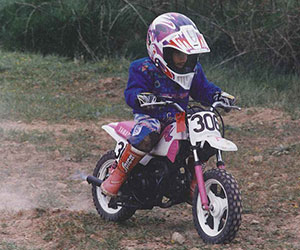
Due to the excellent results of 2003, the following year Marc jumped to the 125 class with a Honda 125 GP. He signed for the RACC Impala team, with Pol Espargaró –who was two years older- as his team mate. After the six races held in Montmeló (2), Valencia (2) and Albacete (2), he took the runner-up position behind his team mate.
A year later, the team changed their name to RACC CajaMadrid and the Monlau mechanics became a part of it. It was an important year for Marc, as it was then when he met Emilio Alzamora, 1999 125cc World Champion with Honda. During that season Marc won the 125cc Catalan Championship, as well as the Supermotard Catalan Championship 85cc class. The following year he repeated the Catalan triumph, and at the same time made his debut in the Spanish Road Racing Championship (CEV), where he achieved eighth overall position.
In 2007 he participated again in the CEV, this time wit h KTM, but several crashes prevented him from taking a better position than ninth overall. Marc, with 1.50m height and 43kg, was forced to take a 20kg ballast that affected the bike negatively in the changes of direction, as the inertia would drag him out of the track. Nonetheless, he was able to win one of the seven races of the Championship, at the Jerez circuit.
— World Championship Debut (2008)
At the end of the 2007 season, shortly before the last race in Valencia, he went with Emilio Alzamora to the Ricardo Tormo Circuit to attend the Valencia Grand Prix. Immersed in the world championship atmosphere, Marc thought he was there to learn and prepare himself for the last CEV round. But Alzamora had a surprise for him: the next year he would be part of the big World Championship family. Both surprised and elated, Marc accepted the challenge and in 2008 he embarked in a new odyssey, in which he would learn and grow as a rider.
His debut in the Motorcycling World Championship was with the Repsol KTM Team livery at the Portuguese Grand Prix that took place in Estoril. During the pre-season, an ill-timed crash ended with a fracture of his right arm that prevented him from being on the starting grid in the first two races. But he was finally able to make his debut around the middle of April. Marc showed glimpses of his talent in that very first race, but it was in the second race, in China, where he took his first two points and made his remarkable potential clear.
In the following races he continued to ride among the top riders, but it was in his sixth race, at the British Grand Prix, where he was able to set a milestone in motorcycling history. Marc took third position, the youngest rider ever to make it onto a World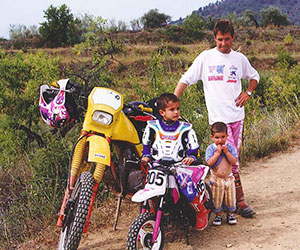 Championship podium.
Championship podium.
The Repsol rider alternated great performances, especially in San Marino and Indianapolis, with an occasional setback, such as in the Malaysian Grand Prix, where he ended his season early. In the practice sessions, Marc was run over by a rival, with incredibly bad luck his leg was trapped between the wheel and the swingarm and broke the epiphyseal plate of his tibia. Nevertheless, the season’s assessment was impressive, as he finished in thirteenth position overall, despite having missed four races due to injury.
— Second year in the World Championship (2009)
Again sporting the number 93 on his Repsol fairing, celebrating the year he was born, Marc demonstrated in his second World Championship campaign the talent that had impressed everyone. Riding in the official KTM team, he broke new records: at the French Grand Prix, he was the second youngest rider ever to take pole position in the World Championship, and fought week after week to finish on the podium. He achieved it in the third round of the year, in Jerez, and despite being among the top group on several occasions, bad luck and crashes combined to prevent him from repeating the feat for the rest of the season.
Despite all the difficulties, Marc finally achieved his objective: to finish nearly all races in the top five. Considered as one of the young promises of the Spanish Motorcycling, he did not lack offers for 2010, but he decided on joining Ajo Motorsport team riding a Derbi.
— World Champion (2010)
It was his third year in the Continental Circus and the first one where he had the same weapons as his rivals. Armed with an identical bike to the rest of the candidates for the top spots, it was the season in which Marc was able to show his full potential and took every opportunity to keep setting records in his short but remarkable career as a rider. From the pre-season, he set a record pace, showing a great adaptation to his new bike and team.
In the first race, Marc showed his aspirations when he took pole position and followed it up with a podium finish, although he had the feeling he could have done better. However, he soon found the first obstacle: after setting another pole position in the second Grand Prix of the season in Jerez, he was incredibly unlucky in the race. He had not completed the first lap when the exhaust system broke, detaching itself and knocking the rear wheel in one of the fast corners at the Andalusian track. Marc was thrown through the air and dislocated his right shoulder.
Putting a lot of effort into his recovery, he once again reached the podium in the following race, in France, and then two weeks later his first victory of his career at Mugello. A success that demonstrated his talent, he went on to win the following four races consecutively, setting all the pole positions and breaking records set years ago by the young Valentino Rossi.
The summer break interrupted Marquez’s winning streak and in the first practice of the Czech Republic Grand Prix he dislocated his left shoulder in a crash. Despite that, he was able to compete in the race and, although he chose the wrong tyres, which ended completely worn, he finished in seventh position. Again with a huge effort in his physical recovery, Marc showed again the high level he had before the summer. Nevertheless, a mistake at the Indianapolis Circuit made him crash again when he was leading the race. He was able to finish tenth – despite receiving a 20-second penalty, and maintained the lead of the Championship.
A lead that, although reinforced by another victory in the following round in San Marino, he lost two weeks later at the Aragon Grand Prix. He was run over by another rider and was forced to leave with no points for the second time in the season. He then faced the Asian leg of the season fully determined and with the personal aim to return to Spain as Championship leader again. He succeeded. Marc dominated in Japan, Malaysia and Australia, winning the three rounds and setting the fastest times in the practice sessions. Undoubtedly, this was an important step forward in his battle for the title, as he set a perfect hat-trick without a single mistake.
Then the Portuguese Grand Prix arrived. Marc astonished all the motorcycling world with an incredible performance. With the race suspended due to the rain, Marc crashed on the new formation lap, less than ten minutes before the restart of the race. His bike was repaired just in time with the help of all his mechanics and even other riders’ mechanics. He started from the last position of the grid, but was already fourth at the end of the first lap after a wonderful performance. In the end, he recorded an epic victory just ahead of Nico Terol. Pol Espargaró, finishing tenth, was out of the Championship battle. The title would be decided in Valencia in a duel between two riders: Marc and Nico Terol.
Marc arrived at the last round of the season with an advantage of 17 points in the overall classification, but perfectly aware that the World Championship had not finished and that he had to remain focused until reaching the chequered flag. In a perfect weekend Marc set yet another pole position, matching the record of pole positions set by a living legend of motorcycling, Repsol Honda’s Mick Doohan. In the race he showed the maturity that had characterised him all season, although for once he avoided entering the battle for victory. His fourth position allowed him to reach the finish line celebrating the title. He was the 2010 125cc World Champion at 17, after taking 10 victories and 12 pole positions.
— Runner-up in Moto2 in his first year (2011)
After winning the title, the natural step for the young rider was to change classes in 2011 and follow his unstoppable progression with any bike he might lay his hands on. Marc joined a team created especially for him, boasting engineers and mechanics with experience in Moto2 and MotoGP. It took him four r aces to get to grips with the class, as three crashes from the opening four races gave him plenty of food for thought. At the French GP, however, he announced his arrival as a serious title contender.
His victory at Le Mans and second place at Montmeló showed that he was not out of his depth in the class, but one race later he suffered another crash whilst fighting for the win at the British GP. This was the final blip before a huge comeback, in which he picked up three consecutive wins —Assen, Italy and Germany—, one second place —Brno—, a further three wins on the bounce —Indianapolis, San Marino and Aragón— and another second place —Motegi.
There was still to be another amazing comeback in 2011 —this time at the Australian GP. After being penalised for an infraction in Free Practice and sent to 38th on the grid, he would have to do something very special to take something away from Phillip Island. That Sunday he overtook 35 rivals to take the last spot on the podium.
Seven wins, three second places and a third place gave Marc the Rookie of the Year honour for 2011, although his season ended on a sour note when he crashed in qualifying for the penultimate race of the season in Malaysia, after marshals failed to display rain flags at that part of the circuit, and was unable to compete in the final two events. That meant that he conceded the title, albeit taking a creditable runner-up spot in the Moto2 World Championship.
— Moto2 World Champion for 2012
Marc faced his second year in the intermediate category with the highest possible aspirations. Accompanied by the same team as the previous year, he fought to repeat the form shown in his brilliant 2011 season. The start of the year was not easy for Marc, who missed almost the entire pre-season whilst recovering from the injury sustained in free practice for the 2011 Malaysian Grand Pri x. Marc had been experiencing double vision which had not improved since the accident and after three months he opted to have surgery on 16 January 2012. He was treated for paralysis of the upper right oblique muscle, caused by trauma to the fourth right cranial nerve. The operation was a success and he recovered in time for the Qatar Grand Prix, the first race of 2012, but had accumulated very few miles on his Moto2 bike. Despite this, he started 2012 as one of the favourites to take the title.
He did not disappoint. Marc overcame everything thrown his way and and took the win in the desert, showing that he was fully recovered and ready to push for the title. That victory was followed by a second in Jerez and another win in Portugal. At the fourth round, held at the Le Mans circuit, the Spaniard took pole position but suffered a crash in an intense downpour on race day. That small blot on his record was followed by 9 podiums from 12 races. Eight wins —in Qatar, Portugal, Holland, Germany, Indianapolis, Czech Republic, San Marino and Japan—, two runner-up finishes —Catalunya and Great Britain—, and three third places —Jerez and Aragon, established his credentials.
With everything going in his favour, rain again caught Marc out at the Malaysian Grand Prix. Three laps into the race, the Repsol rider crashed out. Fortunately, the advantage gained at the preceding races allowed for him to clinch the crown just one week later in Australia, where he was crowned Moto2 World Champion.
Step up to MotoGP and first World Championship
As the Repsol Honda Team bid farewell to double World Champion Casey Stoner, after the Australian announced his retirement at the French GP in 2012, there was a huge amount of expectation on what Marc could achieve in his first season in MotoGP and how he would adapt to the bigger bike. A strong pre-season saw Marc get to grips with his RC213V and by the Malaysian Winter tests, he demonstrated he was able to fight with the elite of the class. On arrival at the private pre-season test in Austin, Marc remained unbeaten in all three days there as he became more and more comfortable on the bike.
In the first race in Qatar, Marc achieved his first podium, fighting with Dani Pedrosa and Valentino Rossi in his first ever race in the premier-class. Then as the paddock flew west to Austin again, this time in race-mode, the young rookie completed the impossible taking pole and recording his first race win in MotoGP in just his second race. In doing so, Marc become the youngest ever rider to win a premier-class grand prix at the age of 20 years 63 days taking the record from Freddie Spencer (who was 20 years 196 days when he won the Belgium 500cc GP at Spa-Francorchamps in 1982).
Unbelievably, Marc was now leading the Championship as the next round got underway in Jerez. A gutsy last corner manoeuvre on 2012 Champion Jorge Lorenzo secured second place for Marc as teammate Dani Pedrosa took his maiden win of 2013. At the next round in France, Marc took his second pole of the season but wet weather on race day saw Marc drop back to 8th on the first lap. It was Marc’s first experience of racing MotoGP bikes in the wet but he used the opportunity to learn and he gradually made his way through the pack. After passing Lorenzo, Bradl crashed out and Rossi made a mistake which promoted him to 5th on lap 18. He then chased down Hayden and Dovizioso to claim a remarkable podium in very difficult conditions.
The Italian GP weekend was one to forget for Marc as he luckily escaped serious injury from a heavy crash in FP2. He was able to ride again for qualifying but was clearly shaken. However, starting from 6th in the race, Marc pushed in the race and was up to second but with just three laps remaining he lost the front and crashed out, unhurt. The next round in Catalunya was a tough weekend for Marc, w ho once again started from 6th on the grid. However, in the race Marc was able to push and again finished on the podium in third position.
On arrival in Assen, the temperatures were cooler and many riders suffered big crashes. Title rival Jorge Lorenzo fractured his collarbone on Thursday’s practice session and Marc suffered a big crash, breaking a finger and toe, in FP3 on Friday. Incredibly Lorenzo was operated on and returned to race, and Marc didn’t let his injuries hold him back either. Marc took 2nd place and an important 20 points after his DNF in Mugello.
The GP of Germany was a huge turning point in the season. Another crash from Lorenzo sidelined him for the race, as he took time to properly recover, and Marc’s teammate Dani Pedrosa also had a big crash – hitting his head hard and cracking his collarbone. Marc needed no other invitation as he dominated the race and regained the Championship lead as his two main rivals were forced to sit out. Marc continued this run of success winning in Laguna Seca – becoming the first rookie to win in there in the premier-class and became the youngest rider to win back-to-back races in the premier class at the age of 20 years 154 days (the previous record-holder was Freddie Spencer, who won the opening two races of the 1983 season in South Africa and then France at the age of 21 years 104 days). Again in Indianapolis, becoming the third rider of all-time to win three premier-class GP races in the same country in a single season (Jorge Lorenzo in 2010 – Jerez, Catalunya & Valencia, and Casey Stoner in 2011 – Catalunya, Aragon, Valencia, in both cases the three wins were from four races held in Spain). Marc also became the first rookie in the premier-class to win three back-to-back races since Kenny Roberts in 1978, who won in Austria, France and Mugello.
As the MotoGP circus headed back to Europe, Marc was on a roll and took his fourth win in a row at Brno, becoming the first rid er since Valentino Rossi in 2008 to win four or more successive races in the premier-class and also the youngest rider to have won four successive premier class Grand Prix races. The run came to an end in Silverstone, when in warm up on Sunday morning, Marc crashed and dislocated his left shoulder. Fortunately he was able to ride and starting from pole, he managed to take second place – marking his 50th podium finish, which at the age of 20 years 196 days made him the youngest rider to reach a half century of grand prix podium finishes, taking the record from Dani Pedrosa who was 21 years 162 days old when he stood on a GP podium for the 50th time.
Marc was back to full fitness two weeks later in Misano and smashed the pole record on his way to securing his sixth pole position of the season. He didn’t have a perfect race but again, was able to take second place and another 20 points, maintaining his lead in the Championship, 34 points ahead of Lorenzo and Pedrosa. In Aragón, the inevitable finally happened. After so many battles and such close racing, the two Repsol Honda Teammates came together – only slightly – on track and the minor contact resulted in the rear wheel speed sensor cable on Dani’s bike breaking, launching the Spaniard into the air and his Championship hopes with him. Marc ran wide but remained unaffected and chased down Lorenzo to take his sixth win of the season and extending his lead by another 5 points.
As the Paddock flew East for the final fly away races, Race Direction pulled in the two Repsol Honda Riders for a hearing concerning the Aragón incident in Malaysia before the race weekend. The outcome was a loss of 25 Constructor Championship points for Honda and another point on Marc’s record (after the two received in Silverstone) – one more would result in him starting his next race from the back of the grid. The team moved on from this and had another fantastic weekend with a 1-2 finish, M arc in second but importantly finishing in front of Lorenzo, putting another four points between them and stretching his lead to 43 points with three races and 75 points.
With no time to rest, the teams flew to Australia for the next race. Cold and wet conditions greeted them in Phillip Island but gradually the weather improved and became quite warm by the weekend. Tyre issues for all the riders (also in Moto2) dictated a dry flag-to-flag race for the MotoGP class, with no rider permitted to make more than 14 laps on any one slick rear tyre. Marc needed to take 7 points or more than Lorenzo – and not lose more then 5 points to Dani – to seal the Championship. Additional issues in warm up on Sunday morning further complicated things and the rules changed once again. The new format dictated a new race distance of nineteen laps with a mandatory change of bikes at least once during the race. Riders were also not permitted to complete more than ten laps on any one rear tyre, meaning they had to change machine at the end of lap nine or lap ten. The race began well and Championship leader Marc held second position from the start, behind pole man Lorenzo. At the end of lap ten, race leader Lorenzo entered the pits – along with the majority of riders – but Marc did not follow, instead completing lap ten and then entering the pits before passing the line of lap eleven. Marc rejoined the circuit as Lorenzo came through turn one and slotted into second. Shortly after Marc rejoined the race, he was shown the black flag – meaning instant disqualification – as he had exceeded the lap limit as set out in Race Direction’s earlier instructions. The team made a mistake, understanding he was able to complete ten laps and come back in before completing lap eleven, and the ‘BOX’ instruction on his pit board was therefore one lap late.
Marc and his team had to move on from this and he had no time to dwell on the situation. The next morning the team were on their way to Japan for the final of the three fly away races. On arrival in Japan, the typhoon in the South of Japan had begun heading north and with heavy cloud cover over the circuit, the circuit medical helicopter was unable to fly and was therefore not available in the event of an emergency, with the nearest hospital an hour away by road. This meant no track action at all, in any class, on Friday.
After an earthquake in the night, the teams arrived at the Motegi circuit on Saturday to be greeted by another obstacle. The sessions were once again cancelled, this time due to track conditions, and the entire paddock forced to wait patiently again. Finally at 12h50 race direction deemed the track safe and the Moto 3 class took to the Japanese circuit. Conditions slowly improved, although there was still a lot of standing water on track when the MotoGP class session began at 13h55. Race direction declared this session as an extended qualifying session with a time allowance of 75 minutes and Marc took second spot on the grid in preparation for the race. Sunday morning, the Sun arrived and presented everyone with the same dilemma; just 45 minutes of dry track set up time. Marc suffered a high speed crash in the session on a cold front tyre and was fortunate to avoid serious injury and received an injection before the race to numb the pain. Having only experienced 45 minutes on a dry track at Motegi on the MotoGP machine, Marc began to have some issues midway through the race. He attempted a few moves on Lorenzo but was unable to complete a pass and finally stopped pushing and settled for second place and important Championship points.
Now with just 13 points separating him and Lorenzo, the final round of the season in Valencia was to be the Championship decider. Warm weather welcomed the MotoGP teams, as did a sell out crowd at the Valencia circuit. Marc was fastest in FP1, FP2 and FP3 – breaking the pole record – and then recorded his ninth pole of the season. Marc rode a mature race, keeping out of the battle between Dani and Jorge, and took a safe third securing his first MotoGP World Championship in his maiden season.
